- Home
- Raymond E. Feist
Prince of the Blood, the King's Buccaneer Page 18
Prince of the Blood, the King's Buccaneer Read online
Page 18
Borric signalled for Suli to climb down and when the boy was near, the Prince said, ‘I think we’ll have to run to the northwest and get around the pickets. He glanced at the sun and said, ‘If we steer away from those western pickets, they’re sure to come running, but if we hold a steady course as if we’re simply going about our business, we may fool them.’ He looked down. ‘See how the water changes colour from here,’ he pointed, ‘to there?’
The boy nodded. ‘That’s because this is a deep channel, and that is a coral reef. This boat has a very shallow draft, so we can slip above those reefs, but that big ship we saw at the harbour would bottom out here and crash. We must also be cautious; some of these reefs are too near the surface for even our small boat, but if we are alert, we can avoid them.’
The boy looked at Borric with fear in his eyes. He obviously felt overwhelmed by what the Prince was saying and didn’t understand. ‘That’s all right,’ said Borric. ‘I’ll tell you what to look for if we have to flee.’
He glanced at the distant western horizon, where he could barely see a single white dot on the surface of blue-green. ‘Anything in close to shore will have just as shallow a draft as we have and probably be faster.’ Checking the luff of the sail to make sure he was at the proper angle to the wind for maximum speed, Borric said, ‘Just keep watching that white speck on the western horizon, Suli, and tell me if it starts to get bigger.’
With concentration that bordered on the single-minded, the boy hung over the windward side of the boat, using the angle of the craft as a means to sit at the highest perch possible, short of climbing the mast again. For the better part of an hour the white spot appeared to neither shrink nor grow, then suddenly it was heading straight at them. ‘Master!’ the boy yelled. ‘They are coming!’
Borric turned the craft, attempting to get the maximum angle to the wind for speed, but the sail slowly grew. It was a faster craft. ‘Damn,’ he swore. ‘They’ll overtake us if we keep running.’
Suli shouted, ‘Master, another!’
As if summoned by the first ship to intercept the pinnace, a second sail appeared upon the northern horizon. ‘We’re cut off,’ yelled Borric. He swung the tiller hard about, cursing himself for a fool. Of course the guards at the harbour mouth had been lax. They were instructed to intercept only those who looked like the runaway, and could clearly see that the two sailors were neither red-headed. But the ships on picket would only know a sail was on the horizon. They would intercept, and Borric wanted nothing to do with close inspection. In Durbin, he might have tried to bluff his way out with a contrived story, but out here, with freedom so close, he wasn’t going to chance another capture. To be caught was to be killed, he reminded himself.
Borric looked about and said, ‘Come here!’
The boy hurried to Borric’s side and the Prince gave him the tiller and boom line. ‘Hold on this course.’
Borric moved quickly to the front of the boat and took the second sail from the locker. He quickly pulled it open and discovered it was a spinnaker. He attached it to the front of the mast, but didn’t raise it. ‘Hurry, master!’ cried the boy.
‘Not now. It would only slow us down. We’re at the wrong angle.’ Borric returned to the tiller.
The two other boats were turning to give chase and now Borric could make them out. The northern interceptor was a large two-masted galleon, fast running before the wind, but slow to manoeuvre and with a deep draft. He knew that captain wouldn’t follow him into the reefs. But the first boat they had seen was a fore-and-aft-rigged, sleek-looking sloop. Newly found upon the Bitter Sea over the last twenty years, they were favoured by pirates working the shoals of the southern coast. Faster than the pinnace in a light wind, they were manoeuvrable and had almost as shallow a draft. Borric’s only hope was to get past the sloop, put on more canvas, and get into the shallowest water possible. Only in a very heavy wind in a broad reach could his pinnace possibly outrun that boat.
The larger boat moved to cut off Borric’s smaller craft and he eased off the tiller, turning more and more upwind. Then he jibbed his boat and left the galleon wallowing close-hauled into the wind, its speed evaporating like water on a hot stone.
The sloop turned to cut him off as he sailed back toward the reef, and Borric spilled wind from his sail, letting the captain of the larger boat think he had cut off the fugitives. Borric concentrated, as it was going to be a very close thing, and any miscalculation would leave him either too much room between the sloop and pinnace, so the larger boat could turn again and intercept him, or bring them too close, so they could be grappled and boarded. Borric pulled hard over on the tiller, as if attempting to turn back away once more. Sailing just shy of the eye of the wind was the only way, he was faster than the sloop in this light breeze, but not by much. And if he attempted to stay that course he would end up sailing directly back to the galleon.
He remembered the first time he had brought a sailboat – a small twelve-foot dingy with a sail – directly in the wind when he first learned to sail, and found the boat sailing backwards! His tutor had tried to hide his mirth, but Erland had been openly mocking about it until a week later he fell to the same fate. Keeping close to a headwind and keeping forward motion was something a trained crew could manage, but here he had only himself and one inexperienced boy.
Borric let the pursuing craft get near enough to make out the crew, nearly thirty unsavoury-looking thugs, all armed with sword and pike. If there are archers on the boat, he thought to himself, we’ll never make it alive.
Then he surprised the crew of the sloop and Suli both, by jibbing his boat directly toward the larger craft. Suli cried out and threw his arms before his face, expecting a collision, but rather than the crack of splitting timbers, the only sound above the sounds of the sea were the loud oaths from the sailors on the sloop, taken by surprise. The sloop’s helmsman reacted as Borric hoped he would, turning his wheel hard over. The sloop’s captain’s curses filled the air. The helmsman was now steering away from the boat they wanted to come alongside and grapple, and he started to turn the wheel back. But the damage had been done.
Borric’s pinnace stood still, head directly into the wind, and Borric shouted, ‘Raise that centreboard!’ Suli did as he was instructed, and the boat was left trembling in the teeth of the wind, then started moving slightly backwards. Unlike the dingy of his youth, this boat would not move sternward obediently, but would want to spin. The trick was to control the turn. Like a dancer spinning on her heels, then sliding across the dance floor, the boat stopped for an instant, started to move backwards, then moved sideways until full into the wind, where it heeled over a moment, then swung away from the sloop, coming quickly around. The sound of the canvas snapping taut echoed across the waters as the pinnace seemed to jump away, running before the wind. ‘Drop the board!’ Borric shouted to Suli and he obeyed. Astonished-looking sailors stood at the rail of the sloop with their mouths open. Then one made so bold as to attempt to leap across the narrow gap between. He fell only a few feet short of the stern of Borric’s craft.
Borric yelled, ‘Suli! Come here!’
The boy scampered to take the tiller from Borric, while the Prince raced to the mast. The instant he was sure they were on a running broad reach again, he hauled the spinnaker aloft. He hoped it would give the pinnace just enough extra speed to stay away from the sloop.
The captain of the sloop, swearing mightily, ordered his men to come about. Quickly, the nimble boat turned and gave chase. Borric divided his attention fore and aft, watching to see if the larger boat was overtaking them, and then looking to see they stayed clear of dangerous shoals.
Suli sat with eyes wide with terror, listening as Borric shouted, ‘A little more to starboard!’
The boy yelled, ‘What, master?’ He stared at the Prince in confusion, not understanding the nautical term.
Borric yelled back, ‘More to the right!’ Borric turned his attention back to the dangers ahead. He shouted to Suli, d
irecting him first to come a little right, then left, then right again, as they steered a maddening course through the shoals.
Borric glanced back and saw the larger boat had closed some distance, and he cursed. Even with the spinnaker, they were not moving fast enough. He yelled, ‘Turn toward shore!’
The boy reacted instantly, turning so hard Borric almost lost his footing. Borric looked for rocks, rocks just below the surface of the water that they could avoid but that would bring their pursuer to a nasty halt.
As they moved closer to shore, the boat’s up and downward movement became more pronounced, as the ground swells moved toward the breaker line. The sound of surf could now be heard clearly. Borric pointed with one hand. ‘There! Steer there!’
Praying to the Goddess of Luck, Borric said, ‘Let us hit that on the crest!’
As if the Laughing Lady had heard him, Borric felt the boat on the rise as they passed over the spot he had marked. Even so, as they started to feel the boat come down, a groaning, tearing sound of the bottom scraping rock could be heard and a teeth-jarring vibration came up through the hull of the boat. The centreboard seemed to pop upward as if by its own volition, then fell back into place.
Suli’s face turned ashen as he crouched, holding on to the tiller as if it were his only connection to life. Borric shouted, ‘Come left!’ and the boy yanked upon the tiller. Again the sound of wood scraping over rock filled their ears, but the boat settled down into a trough and rose without further difficulty.
Borric glanced back and saw the sloop heeling over as the captain gave orders to his frantic crew to turn away from shoals too lethal even for his shallow craft. Borric gave a low whistle of relief.
Turning his mind to what to do next, he signalled Suli to head slightly away from the coast, picking up speed as they moved out of the tide’s pull and into a better angle away from the wind. The freshening breeze moved the boat along, and Borric could see the sloop fall farther behind with every minute as the captain had to stay outside the reef that now lay between the two boats.
Borric lowered the makeshift spinnaker and took the tiller from Suli. The boy grinned at him with an expression that was half-delight, half-terror. Perspiration soaked the lad’s tunic and Borric found himself wiping his drenched brow.
Borric pointed the boat slightly upwind and could see the sloop’s sail falling off even farther as the reef ran off toward the northwest. He laughed. Even with the headsail jib the sloop’s crew was running out, it was too late. By the time they rounded the reef, the pinnace would be so far ahead they could be anywhere upon the sea. It would be nightfall before the distance could be made up, and Borric planned on being far away by nightfall.
The next two hours passed uneventfully, until Suli left his place at the bow and came toward Borric. Borric noticed water splashing under the boy’s feet.
Borric looked down and saw water was gathering in the bilge. ‘Start bailing!’ he yelled.
‘What, master?’
Realizing the boy didn’t understand that term either, he said, ‘Get the bucket from the locker and start scooping up the water and pouring it out!’
The boy turned, got the bucket, and began bailing out the water. For an hour or so it seemed the boy kept even with the incoming water, but after another hour of the exhausting work, the water had gathered about his ankles. Borric ordered him to switch places and took over. After another hour, it was clear that even when bailing at a furious rate, it would prove an eventually hopeless undertaking. Sooner or later the boat was going to sink. The only question seemed to be when and where.
Borric glanced to the south and saw that not only had the coastline been running southwest, away from them, but their course was northwest, toward the Straits of Darkness. By his reckoning, they were now as far away from the coastline as they could get, slightly northeast of Ranom, where the coastline would turn northward. Borric had to make a quick choice, either head for the south shore, or hope that between Suli and himself they could keep the boat afloat long enough to reach the coast somewhere south of LiMeth. As he was about equal distance between either part of the shoreline, he decided his best choice was to keep as much speed as possible and hold his present course.
As the sun sped westward, Borric and Suli alternated bailing out the boat and keeping it pointed toward LiMeth. Near sundown, a scattering of clouds appeared in the north and the wind turned, now blowing into their faces. The pinnace was decent enough travelling into the eye of the wind, but Borric doubted they would survive long enough to reach land if it started to rain. As he considered this, the first drops hit him in the face, and less than an hour later, the rain began to fall in earnest.
As the sun rose, a ship was upon them. Borric had seen its approach for the last quarter hour, as it suddenly had appeared out of the predawn gloom. Both the Prince and Suli, exhausted from a night’s bailing to keep afloat, could barely move. Yet Borric mustered what little reserve of energy he possessed and stood up.
They had taken down the sail at sundown, decided it was better to drift in the dark and have both of them bail for periods, than to sail blindly in the gloom. The sound of breakers would alert them to any chance of coming too close to shore. The only problem was that Borric didn’t have any idea of how the currents in this part of the Bitter Sea ran.
The ship was a small three-masted merchantman, square-rigged with a lateen sail on the back. It could have come from any nation on the Bitter Sea, so it could be their salvation or their doom.
When the ship was close enough for him to be heard, Borric called out, ‘What ship?’
The Captain of the vessel came to the rail as he ordered the helm put over, bringing the ship to a slow pace as it passed Borric’s sinking pinnace, wallowing in the chop. ‘The Good Traveller, out of Bordon.’
‘Where are you bound?’
‘Bound for Farafra,’ came the reply.
Borric’s heart began to beat again. It was a Free Cities trader bound for an Empire city on the Dragon Sea. ‘Have you berths for two?’
The Captain looked down at the ragged pair and their rapidly wallowing boat and said, ‘Have you the price of passage?’
Borric did not wish to part with the coins he had taken from Salaya, as he knew they would need them later. He said, ‘No, but we can work.’
‘I’ve all the hands I need,’ called back the Captain.
Borric knew by stories that the Captain would not likely leave them to drown – sailor’s superstition forbade it – but he could exact a price of an indenture for several cruises; seamen were an inconstant lot and keeping a steady crew was difficult. The Captain was bargaining. Borric pulled out the rusty fishing knife and brandished it. ‘Then I order you to strike your colours; you are all my prisoners.’
The Captain stared in wide-eyed disbelief, then began to laugh. Soon every sailor on the ship was laughing uproariously. After a moment of genuine amusement, the Captain called out, ‘Bring the madman and the boy aboard. Then make for the Straits!’
• CHAPTER NINE •
Welcome
THE TRUMPETS SOUNDED.
A thousand soldiers came to attention and presented arms. One hundred drummers on horseback began a rhythmic tattoo. Erland turned to James, who rode to his left, and said, ‘This is unbelievable!’
Before them stood the Imperial City, Kesh. They had entered the ‘lower city’ an hour earlier, to be met by a delegation from the City Governor and his retinue. It was the same ceremony they had been forced to endure at each stop along the wearisome journey from Nar Ayab to the capital. When the Governor of Nar Ayab had met them at the outskirts of town, Erland found the welcome a relief from his black mood. He had been numb with Borric’s death for nearly a week, giving himself over to dark bouts of depression, interspersed with rage at the unfairness of it all. The pageantry of the Governor’s welcome had taken his mind off the ambush for the first time, and the novelty of seeing such a display had kept him diverted for over three hours.
&nb
sp; But now, the displays wore upon his patience. He had received another extravagant welcome at the cities of Kh’mrat and Khattara, and half a dozen other welcomes that might have been smaller in scale, but were just as formal and tedious at smaller towns along the way. From any official from Regional Governor down to town alderman, Erland had been forced to endure welcoming speeches from them all.
Erland glanced behind to where Locklear rode with the Keshian official sent to meet them at the lower-city gates. The Prince signalled, and both men set heels to their mounts, trotting them to where Erland rode. The official was one Kafi Abu Harez, a noble of the Beni-Wazir, one of the desert people of the Jal-Pur. Many desertmen had come to Imperial service over the last hundred years, with a marked preference and talent for diplomacy and negotiations. Kesh’s old Ambassador to the Western Realm, Abdur Rachman Memo Hazara-Khan, deceased for ten years now, had once told Erland and his brother, ‘We are a horse people, and as such we are rigorous horse traders.’ Erland had heard his father curse the man with grudging respect enough times to believe it so. He knew that whatever else this protocol officer might be, he was no man’s fool and he needed to be watched. The desertmen of the Jal-Pur were terrible enemies.
Kafi said, ‘Yes, Your Highness. How may I serve you?’
Erland said, ‘This is a bit of a change from what we’ve been seeing. Who are these soldiers?’
Kafi pulled his robe around him slightly as he rode. His outfit was similar to those Erland had seen before in Krondor, head covering, tunic, trousers, long vest, knee-high boots, and belt. But where this costume differed from those Erland had seen before was in the intricate designs sewn into the fabric. Keshian court officials seemed to display an almost unnatural affection for gold thread and pearls.
‘These are the Imperial Household Guard, Highness.’
Erland casually said, ‘So many?’
‘Yes, Highness.’

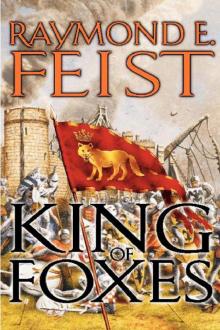 King of Foxes
King of Foxes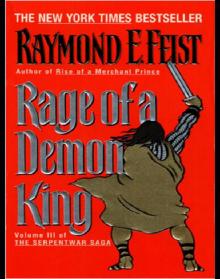 Rage of a Demon King
Rage of a Demon King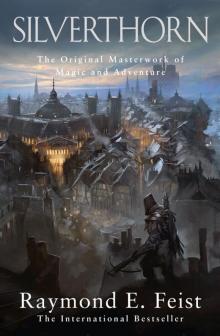 Silverthorn
Silverthorn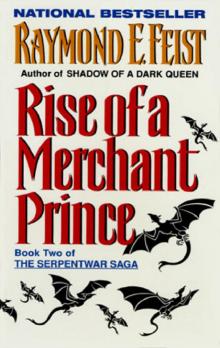 Rise of a Merchant Prince
Rise of a Merchant Prince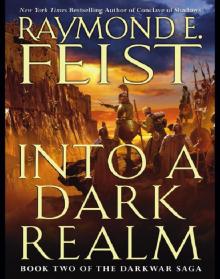 Into a Dark Realm: Book Two of the Darkwar Saga
Into a Dark Realm: Book Two of the Darkwar Saga Shadow of a Dark Queen
Shadow of a Dark Queen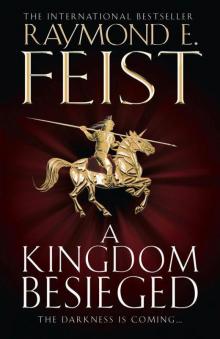 A Kingdom Besieged
A Kingdom Besieged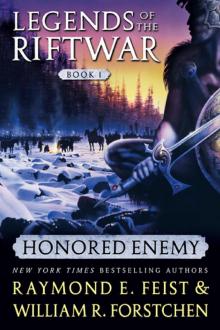 Honored Enemy
Honored Enemy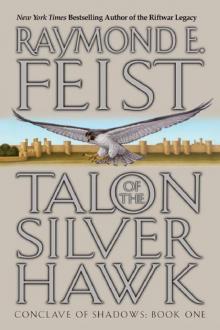 Talon of the Silver Hawk
Talon of the Silver Hawk The Complete Legends of the Riftwar Trilogy
The Complete Legends of the Riftwar Trilogy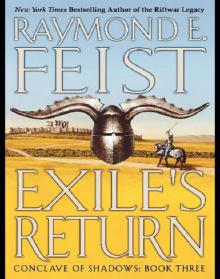 Exile's Return: Conclave of Shadows: Book Three
Exile's Return: Conclave of Shadows: Book Three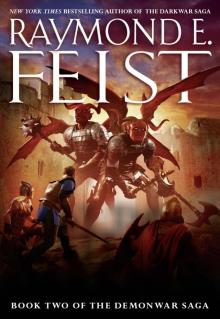 At the Gates of Darkness
At the Gates of Darkness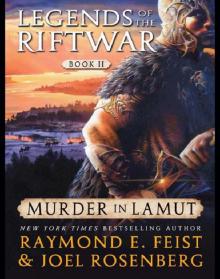 Murder in LaMut: Legends of the Riftwar: Book II
Murder in LaMut: Legends of the Riftwar: Book II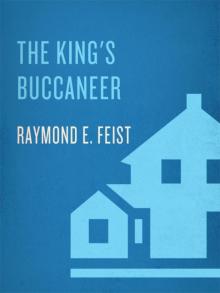 The King's Buccaneer
The King's Buccaneer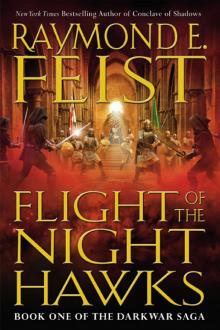 Flight of the Nighthawks
Flight of the Nighthawks The Riftwar Saga
The Riftwar Saga A Darkness at Sethanon
A Darkness at Sethanon Magician: Master
Magician: Master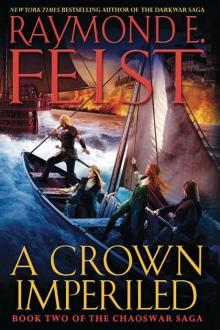 A Crown Imperiled
A Crown Imperiled Magician: Apprentice
Magician: Apprentice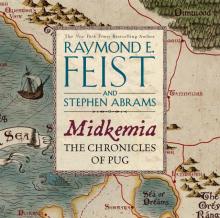 Midkemia
Midkemia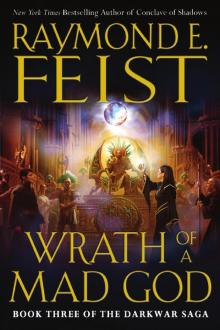 Wrath of a Mad God
Wrath of a Mad God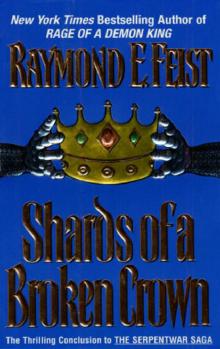 Shards of a Broken Crown
Shards of a Broken Crown Magician's End
Magician's End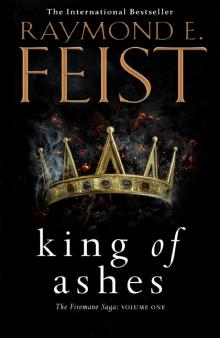 King of Ashes
King of Ashes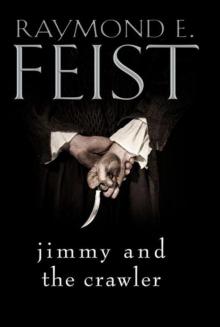 Jimmy and the Crawler
Jimmy and the Crawler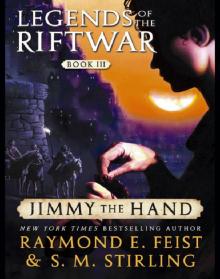 Jimmy the Hand: Legends of the Riftwar, Book 3
Jimmy the Hand: Legends of the Riftwar, Book 3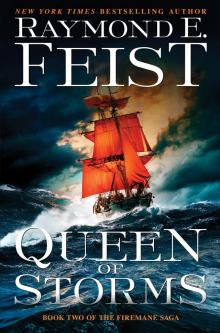 Queen of Storms
Queen of Storms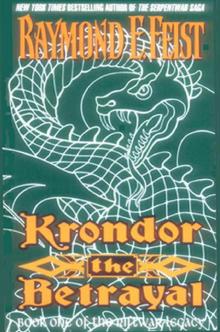 Krondor: The Betrayal
Krondor: The Betrayal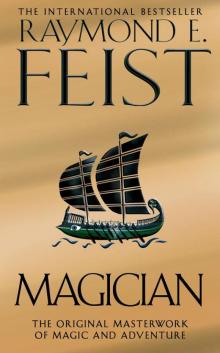 Magician
Magician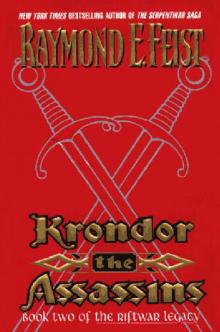 Krondor: The Assassins
Krondor: The Assassins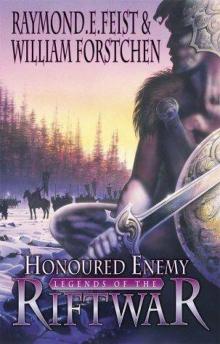 Honoured Enemy
Honoured Enemy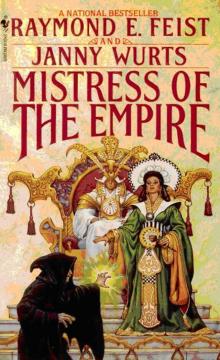 Mistress of the Empire
Mistress of the Empire The Complete Empire Trilogy
The Complete Empire Trilogy Legends 1 - Honoured Enemy
Legends 1 - Honoured Enemy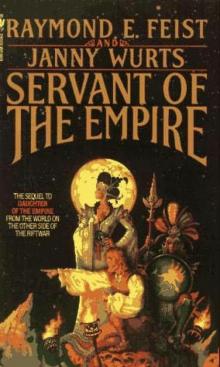 Empire - 02 - Servant Of The Empire
Empire - 02 - Servant Of The Empire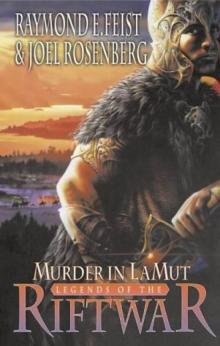 Murder In LaMut
Murder In LaMut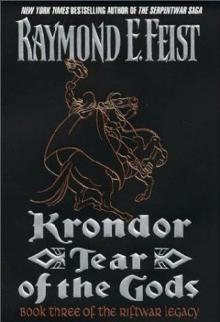 Krondor Tear of the Gods
Krondor Tear of the Gods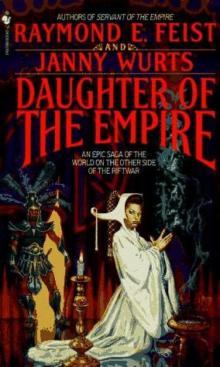 Empire - 01 - Daughter Of The Empire
Empire - 01 - Daughter Of The Empire![King of Ashes [Book One] Read online](http://i1.bookreadfree.com/i1/03/30/king_of_ashes_book_one_preview.jpg) King of Ashes [Book One]
King of Ashes [Book One]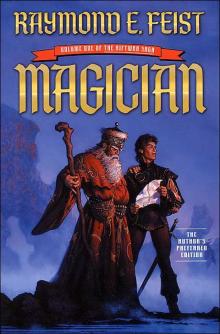 Magician (10th Aniversary Edition)
Magician (10th Aniversary Edition)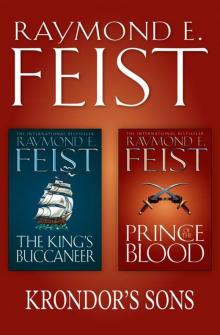 Prince of the Blood, the King's Buccaneer
Prince of the Blood, the King's Buccaneer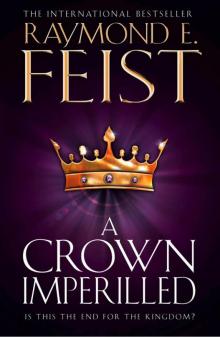 A Crown Imperilled cs-2
A Crown Imperilled cs-2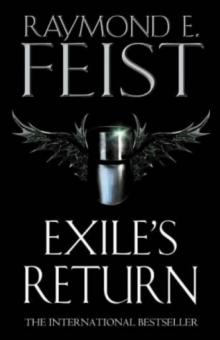 Exile's Return
Exile's Return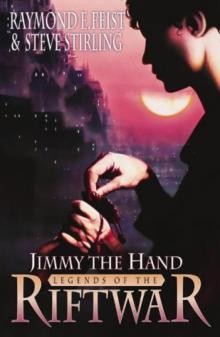 Jimmy the Hand
Jimmy the Hand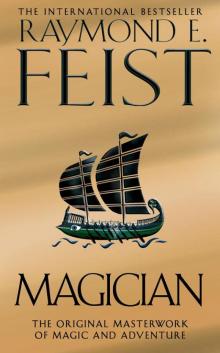 Book 1 - Magician
Book 1 - Magician Empire - 03 - Mistress Of The Empire
Empire - 03 - Mistress Of The Empire Darkness at Sethanon
Darkness at Sethanon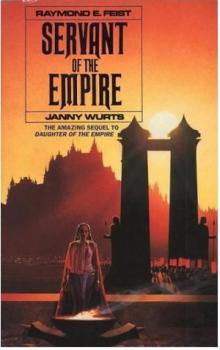 Servant of the Empire
Servant of the Empire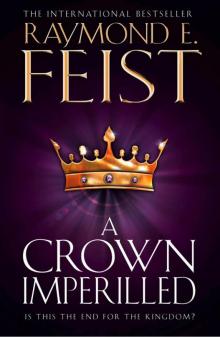 A Crown Imperilled
A Crown Imperilled Rides a Dread Legion
Rides a Dread Legion Legends of the Riftwar
Legends of the Riftwar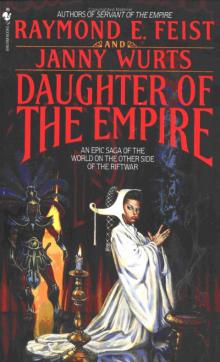 Daughter of the Empire
Daughter of the Empire The Riftwar Saga Trilogy: Magician, Silverthorn and A Darkness at Sethanon
The Riftwar Saga Trilogy: Magician, Silverthorn and A Darkness at Sethanon